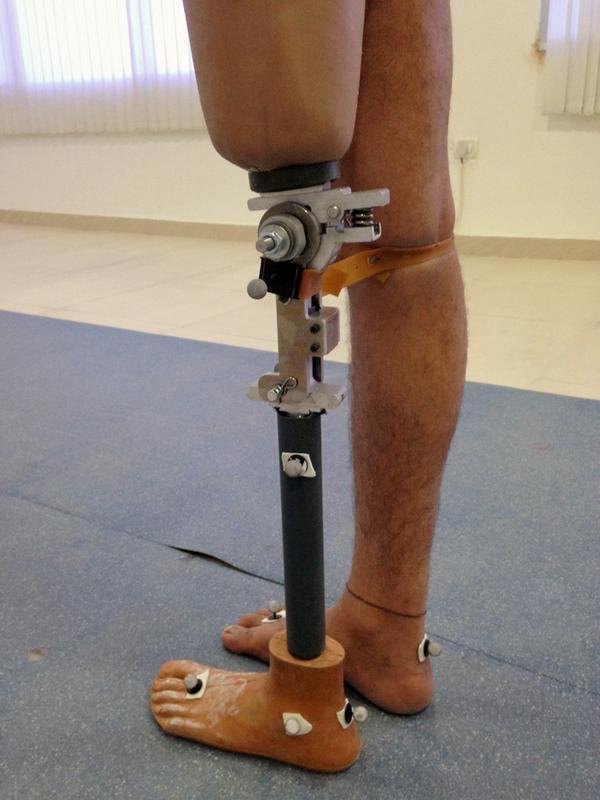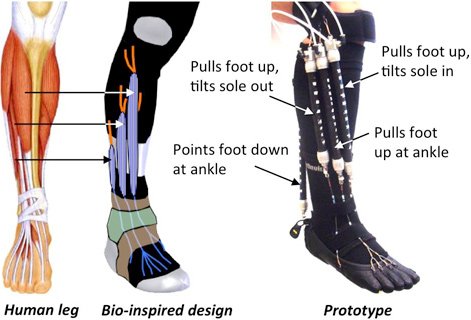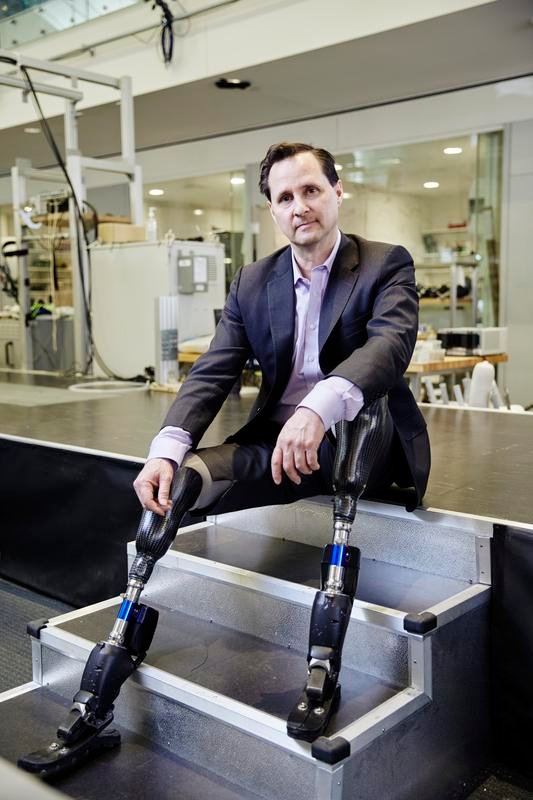Certainly knee is not a part of the body that has ability to think for itself nor move by itself unless it is able to communicate with the brain. Until recently, prosthetic knee systems will have to be programmed by a technician at the point of fixing it on individuals. Even with this advance, it cannot feel like a natural knee and the amputees wearing them cannot walk properly or the way they would naturally walk. However, researchers (Hugh Herr and Arizona Wilke field) at Massachusetts Institute of Technology (MIT) has developed a new surgical approach that could allow artificial limbs to feel like natural limb. This new approach enables amputees to seance or have a feeling of where their limbs are in space and the right force being exerted on them. This is achieved by surgically integrating the prosthetic limb, left over nerves and muscle grafts.

"We are talking about a dramatic improvement in patient care. Right now there is no robust neutral method for a person with limb amputation to feel proprioceptive positions and forces applied to the prosthesis. Imagine how that would completely hinder one's ability to move, to successfully balance, or to manipulate objects," says Hugh Herr, who's one of the study senior authors. Source
By using rats as experimental animals, the researchers were able to show in a very unambiguous way that their approach generates muscle-tendon sensory feedback to nervous system. This generated sensory feedback signals explains why it is possible for amputees to feel the position of the prosthetic limb in space as well as right amount of force being exerted on it.

How Joint Movement Occurs, effect of amputation & the site of research interest

Our ability to move our limbs, sense their position in space as well as the force that is applied to them, is dependent on the activities of two opposing muscles known as agonist and antagonist muscles. These two muscles are unified in pairs but exert their influences in opposite direction to bring about movement at knees. For movement to occur at knees, one has to contract while the other stretches simultaneously. It is this stretching motion that sends muscle-tendon sensory feedback to central nervous system where the packet of information is analyzed to give information relating to limb position in space, and the force that is applied to it. In the absence of this agonist-antagonist arrangement, there is way we can move our limbs nor know their position in space nor the strength of force that is applied to them.
It is this pair of muscles that are also severed during amputation in a way that completely destroyed the ability of the amputee to sense the position of his leg in space alongside the force applied to it.
“They have to visually follow their hands or their limbs, because there isn’t any feedback from the device or residual limb that tells their brain where their prosthetic limbs are in space,” says Shriya Srinivasan, the papa's lead author. Source

The disruption caused by amputation on agonist-antagonist arrangement is what the researchers sought to repair and hence, the site of research interest. Normally, some of the nerves that are involved in relaying sensory signals to the amputated limb is intact. It is these nerves that are taken by the researchers and then connected to a pair of muscles that have been taken from another parts of the body and grafted on to the site of amputation. By this, the nerves are now an integral part of the grafted pair of muscles. With this, when the brain sends signals for movement to occur, one of the muscles contracts while the agonist extends to send feedback information to the brain on strength of movement as well as the force applied to the limb.
The new technique, called an agonist-antagonist myoneural interface, was tested in rodents. The MIT team operated on seven rats, severing muscles and nerves in the back right leg of each. Researchers then grafted on a pair of muscles about 3 centimeters long, connected severed nerves, and let the rats heal for 4 months. When electrodes were attached, the grafted muscles worked in tandem, one contracting and the other stretching. They also emitted electrical signals in proportion to the stimulation. That response suggests that the technique could allow for fine-grained control of a human prosthetic, the researchers report today in Science Robotics. Inspection under a microscope showed that the grafts healed well and were populated with new nerves and blood vessels and healthy neuromuscular junctions. Source
With Successes that have been recorded with rats, the researchers hope to commence human trials as soon as possible with anticipation that everything will work out fine. And human amputees will once again feel position, force and speed in much the same way they once felt when their biological limbs are in tact.
References for further reading

Newbie's Corner
Don't give up. Success is within reach only if you persevere
Starting out in any endeavor in life is always not easy. And so expecting otherwise is therefore an indirect expression of unreadiness in pursuit of any worthwhile goals. This has been the core definition of my person. So in any endeavor I find myself, I usually stayed back even when everyone has left to see if there would ever be a chance for success. Only when all indicators turn red that I would throw in the towel. I am grateful to God that I didn't give up in the face of initial challenges.
Thanks for reading.
Follow @eurogee, the Steemivangelist and the founder of @euronation Newbie's Support Team; follow @euronation
Don't Exit Without Voting For Witnesses!
No Witnesses = No Steem Blockchain; If You Truly Love Here, Vote For Witnesses NOW!
Below is the screenshot of my top witnesses; please vote them!

Click This Link To Vote Now
Witnesses are equivalent to life and blood of steem blockchain. Without them, the blockchain will seize to function and we will all be stranded here. Click here to read more on why it is important to vote for witnesses


Though technology Is advancing at a very fast pace. But nature can never be changed neither can it be substituted
Exactly what I wanted to say. Natural and man made can never compete. Kudos to our scientists worldwide.
This is so educative